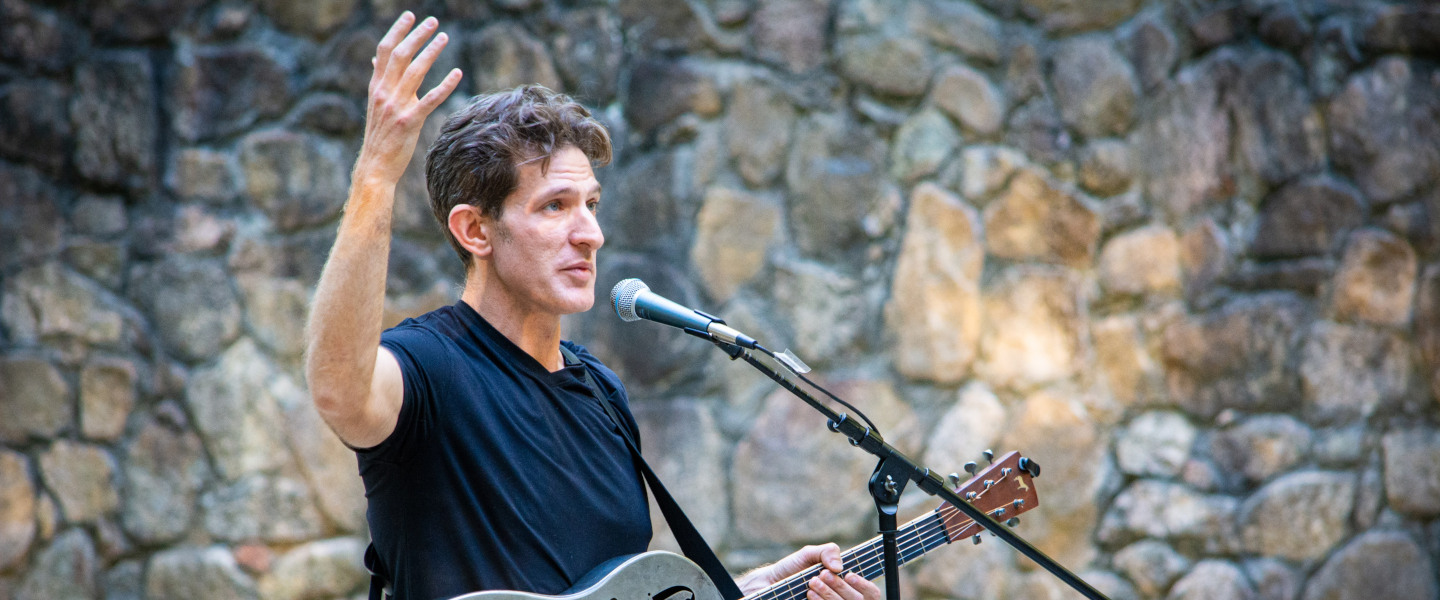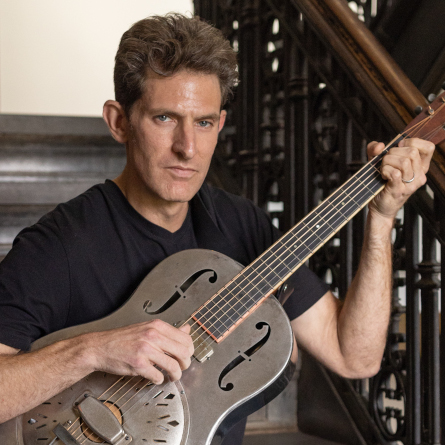
Musician provides Classics students with a fresh take on Homer’s ‘Iliad’
Almost 3,000 years ago, the Greek poet Homer composed more than 15,000 lines of dactylic hexameter about the Trojan War. An epic poem about the possibly true, possibly legendary Greek siege of the West Asian city of Troy in the 12th or 13th century B.C.E., the Iliad and its companion text of the same length and style, the Odyssey (which follows King Odysseus of Ithaca as he travels home after the war), are still widely read and studied today.
Much has changed in three millennia, but the way people connect and tell stories remains the same. That was on display at Connecticut College on Nov. 18 when Assistant Professor of Classics Brett Evans brought Chicago-based musician Joe Goodkin to campus in association with the new Classics course, “Tales of Troy.” Evans said his course “introduces students to the big questions posed by Homer's Iliad and Odyssey and how later Greeks and Romans responded to those questions in poetry, history, rhetoric and philosophy.”
Goodkin, who holds a B.A. in Classics from the University of Wisconsin at Madison, gave an informal presentation to “Tales of Troy” students and other Classics majors called “How to Be a Modern Bard.” He discussed his artistic process and how he engaged with Homer’s work and modern-day war veterans to create “The Blues of Achilles,” a 17-song blues rendition/folk opera of the Iliad that was released in 2022. Goodkin wrote each song from the perspective of one of the poem’s mythological characters, including Achilles, Agamemnon, Briseis, Helen and a horse.
Goodkin has also composed a 35-minute continuous 24-song folk opera inspired by the Odyssey. Addressing the students, he said, “I wrote my Odyssey piece when I was not much older than you, just out of college. It was kind of an extended school project. I had youthful ignorance and no expectations around that piece. I just thought, ‘Hey, I'll write a folk opera about Homer’s Odyssey,’ and it was done in a couple months. I didn't know I'd still be performing it 20 years later.”
He continued, “By the time I got to writing about the Iliad, I didn't know what to do with it. I knew that the first time I read it in Greek, I cried. I knew that every time I read it in English, to this day, I almost cry, and I felt this weight of telling the story in a way I did not feel with the Odyssey. I felt an obligation to tell it in a way that honored what I felt when I read it as an undergrad and beyond.”
That evening in Conn’s Oliva Hall, Goodkin, who has performed his Homeric pieces in all 50 states and throughout Europe nearly 500 times since 2002, played “The Blues of Achilles” on his Mule Resonator guitar, which he let audience members check out and play afterward. The Faculty-Student Engagement Fund and the Department of Classics, Arabic and Jewish Studies sponsored Goodkin’s visit, which was free and open to the public.
Theo Andres ’27, a double major in history and gender, sexuality and intersectionality studies from Glen Ellyn, Illinois, said, “I think Joe Goodkin's performance was an incredible way to revive the oral tradition of singing stories like the Iliad. He captured the emotional essence of the tale in a unique way that was still very truthful to the text. His songs transmit nearly 3,000-year-old emotions, characters, stakes and relationships in a beautifully folky and modern album, and made people like me, who have read the text over and over, cry as if reading it for the first time again.”


